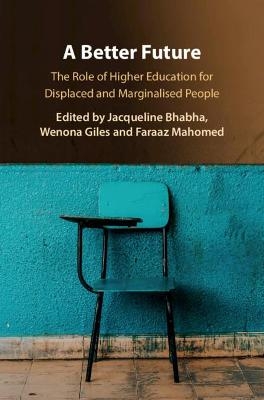
A Better Future
Cambridge University Press (Verlag)
978-1-108-49688-9 (ISBN)
Policy makers, advocates and scholars have long concentrated on the importance of equal access to primary and secondary education as a foundation for a democratic and just society. Despite the growing importance of higher and specialist education in an increasingly technological and skill-focused global market, tertiary education has attracted much less attention. And yet, universities and colleges are epicentres of egregious disparities in access, which impinge on traditionally marginalized communities, such as racial minorities, migrants, indigenous populations, and people with disabilities. By drawing attention to this issue and assembling first-rate material from scholars and policy makers across the globe, this book performs an invaluable service for those interested in understanding and fighting a highly significant violation of educational opportunity and social justice.
Jacqueline Bhabha is Professor of the Practice of Health and Human Rights at the Harvard T. H. Chan School of Public Health, Massachusetts. She is also Director of Research at the Harvard FXB Center for Health and Human Rights, the Jeremiah Smith Jr Lecturer in Law at Harvard Law School, and an adjunct lecturer in public policy at the Harvard Kennedy School. Wenona Giles is Professor Emerita and Senior Scholar in the Anthropology Department and Resident Research Associate of the Centre for Refugee Studies, York University, Toronto. She is also Fellow of the Royal Society of Canada. Faraaz Mahomed is a clinical psychologist and research associate at the Harvard FXB Center for Health and Human Rights, Massachusetts. He is also a Research Associate at the Harvard Law School Project on Disability and a Visiting Research Fellow at the Center for Applied Legal Studies at the University of the Witwatersrand, South Africa.
Introduction Jacqueline Bhabha, Wenona Giles and Faraaz Mahomed; Part I. Encountering Marginalisation: Disparities in Higher Education and Broader Society: 1. Disparities in participation in higher education among migrants: a comparative perspective in OECD countries Francesca Borgonovi and Gabriele Marconi; 2. Access to higher education and retention of students with a migrant background in the Netherlands: a comparative analysis Maurice Crul and Frans Lelie; 3. Roma in higher education: access denied Margareta Matache, Tanja Jovanovic, Simona Barbu and Jacqueline Bhabha; 4. Higher education in exile: developing a sense of self, belonging, and purpose for newcomer youth Vidur Chopra and Sarah Dryden-Peterson; 5. Continuing inequalities in South African higher education: the changing complexities of race and class Crain Soudien; 6. Inequities in US higher education access and success: obstacles and opportunities for marginal populations Richard Kazis; 7. Exploring place: indigenous students in US higher education John L. Garland, Charlotte E. Davidson and Melvin E. Monette-Barajas; Part II. Deconstructing Marginalisation: Political and Legal Solutions to Marginalisation, and their Limitations: 8. Providing access to higher education for refugees in Europe: an opportunity to rethink the university and its role in the public sphere Prem Kumar Rajaram; 9. The German case: an analysis of refugee student supports in higher education Lisa Unangst; 10. Colombian distress migrants in Ecuador: limits to higher education Elizabeth Donger; 11. Transcending socio-cultural barriers: access to tertiary education of Muslim minority youth in Greece Nelly Askouni and Thalia Dragonas; 12. Combating the exclusion and marginalization of persons with intellectual disabilities in higher education in the United States Matthew S. Smith and Michael Ashley Stein; 13. 'Invisible' disabilities in South Africa's higher education sector: an analysis of the inclusion of persons with psychosocial and intellectual disabilities Faraaz Mahomed; Part III. Confronting Marginalisation: Narratives of Affected Students and Educators and Innovations in Higher Education Settings: 14. 'Now I constantly challenge society by bringing my existence forward': creating counter spaces/stories with Sanctuary students transitioning to higher education in Toronto Paloma E. Villegas and Tanya Aberman; 15. Toward an emergent theory of fallism [and the fall of the white-liberal-university in South Africa] A. Kayum Ahmed; 16. Family sacrifice, faltering systems: the case of first generation college students in Rajasthan Orla Kelly, Jacqueline Bhabha and Aditi Krishna; 17. DACAmented: impossible realities, deferred actions, delegated dreams, and stories of resilience Carlos Aguilar and Roberto G. Gonzales; 18. Building ethical relationships through the Borderless Higher Education for Refugees project in Dadaab, Kenya Wangui Kimari and Wenona Giles; 19. The 'Jungle' is here; the jungle is outside: university teaching in the Calais refugee camp Corinne Squire and Tahir Zaman; 20. Culture, gender, and technology: mediating teacher training using text messaging in refugee camps Dacia Douhaibi, Negin Dahya, Olivier Arvisais and Sarah Dryden-Peterson.
| Erscheinungsdatum | 03.08.2020 |
|---|---|
| Zusatzinfo | Worked examples or Exercises; 18 Tables, black and white; 5 Line drawings, black and white |
| Verlagsort | Cambridge |
| Sprache | englisch |
| Maße | 160 x 235 mm |
| Gewicht | 800 g |
| Themenwelt | Geisteswissenschaften ► Psychologie ► Pädagogische Psychologie |
| Sozialwissenschaften ► Ethnologie | |
| Sozialwissenschaften ► Soziologie | |
| ISBN-10 | 1-108-49688-1 / 1108496881 |
| ISBN-13 | 978-1-108-49688-9 / 9781108496889 |
| Zustand | Neuware |
| Haben Sie eine Frage zum Produkt? |
aus dem Bereich


